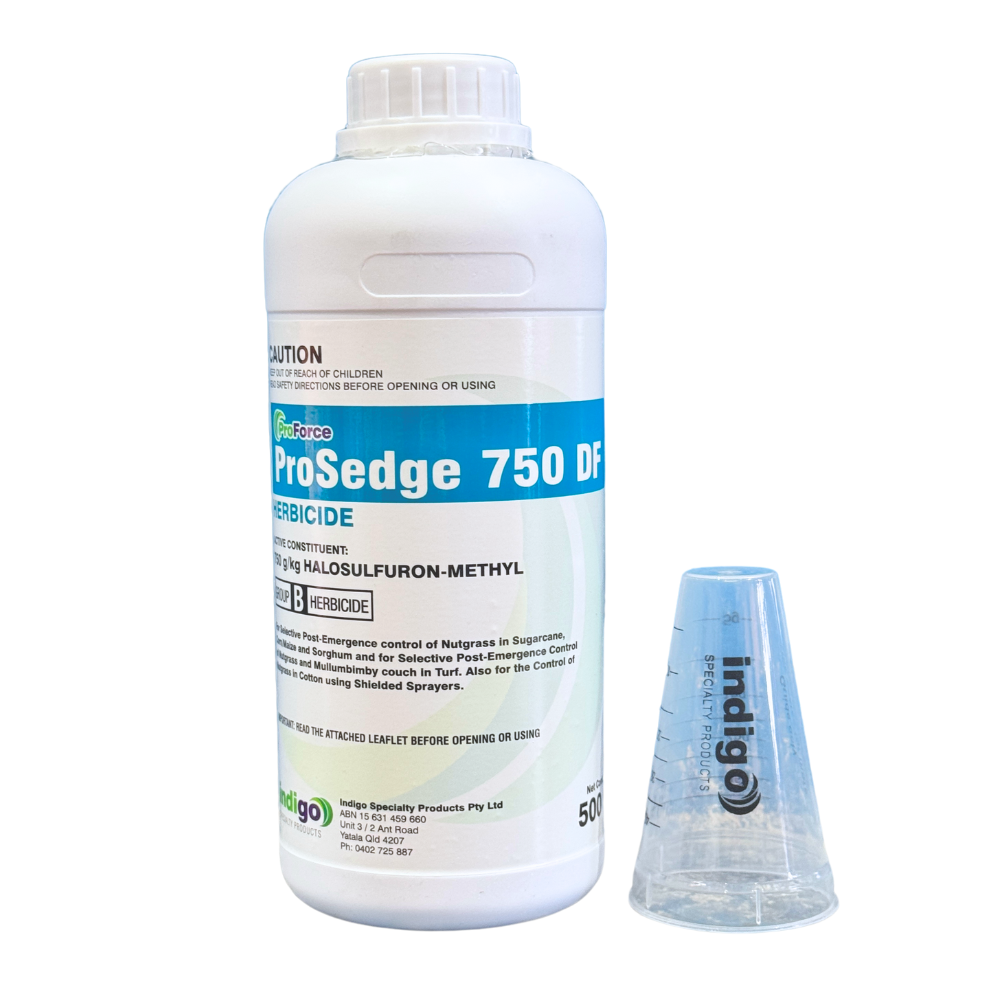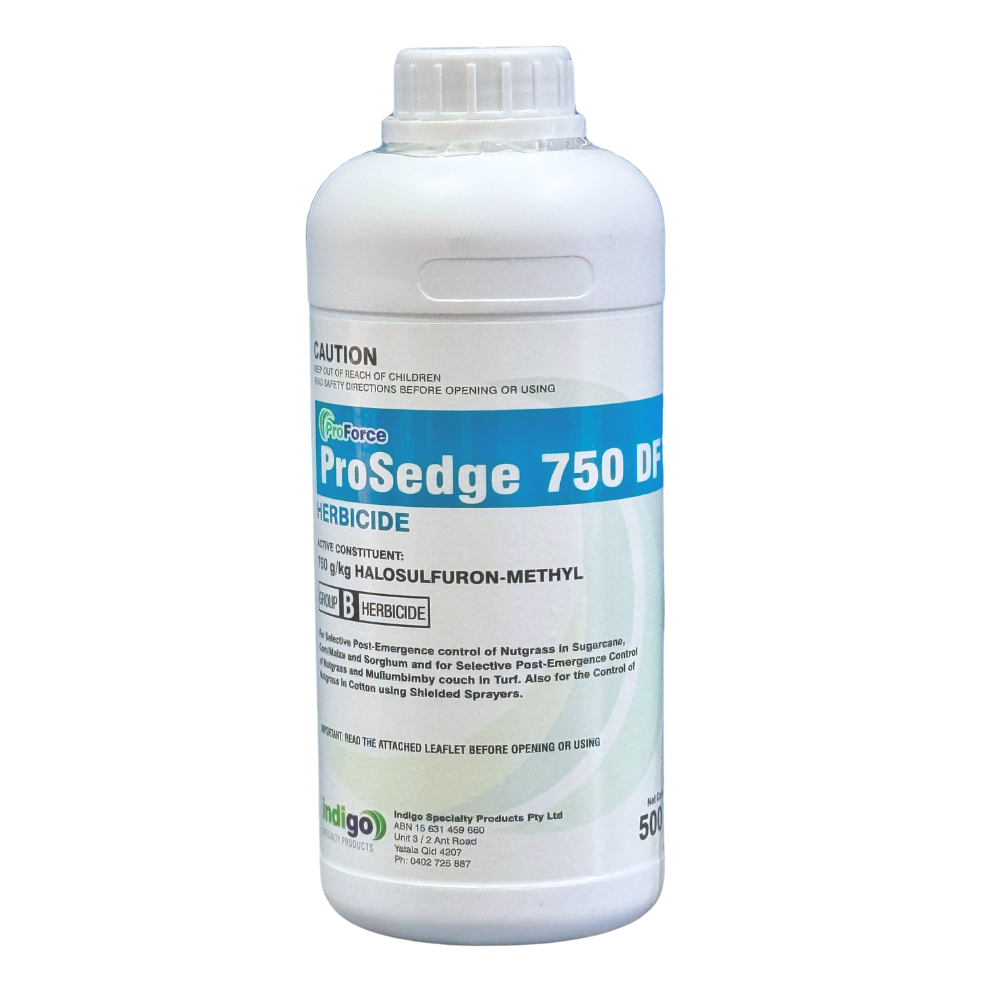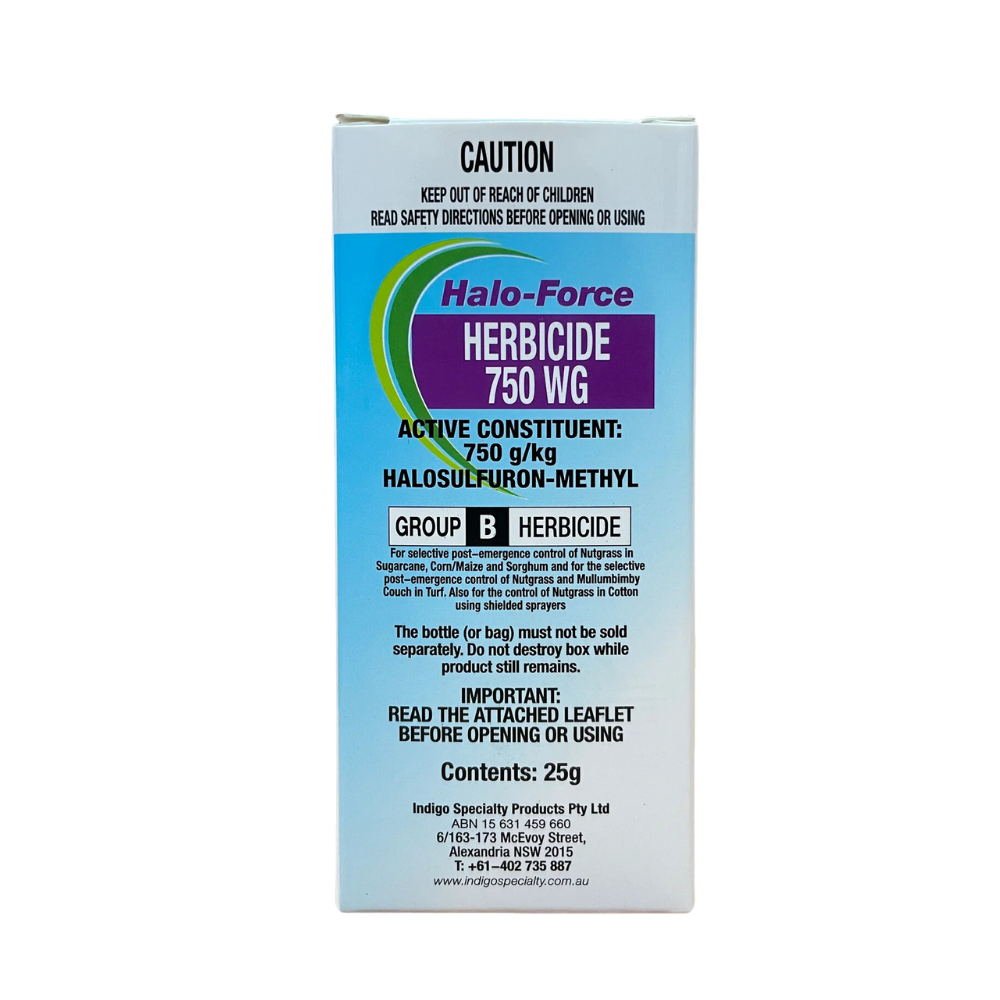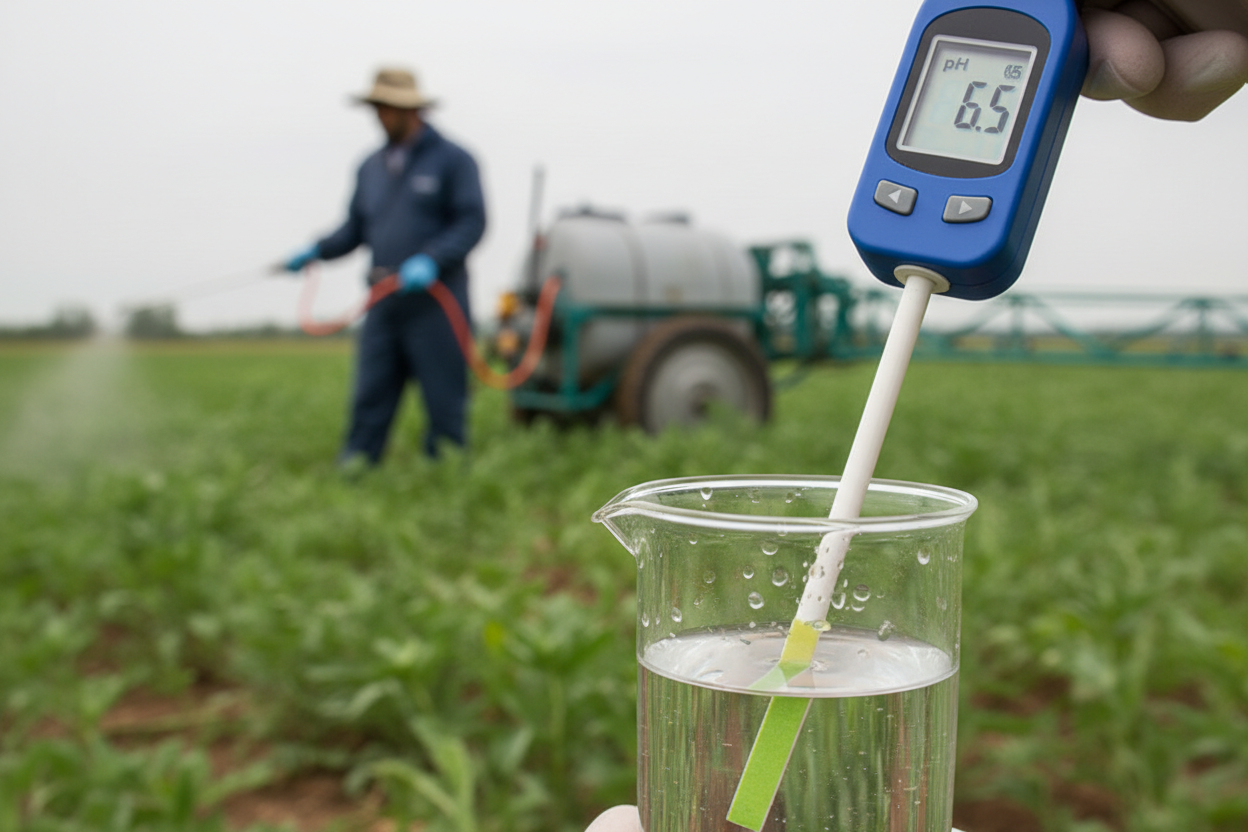


Indigo Prosedge 750 DF Halosulfuron Methyl
Group 2 Herbicide
ProSedge 750DF is a systemic herbicide containing the active ingredient Halosulfuron-methyl. It is registered for the control of Mullumbimby Couch (Green Kyllinga) and Nutgrass in a broad range of turfgrasses including Common Couch, Hybrid Couch, Bentgrass, Buffalograss, Kikuyu, Queensland Blue Couch, Perennial Ryegrass, Tall Fescue, Durban Grass and Carpetgrass. ProSedge 750DF is a 750g/kg Dry Flowable Dispersible Granule formulation.
Key Features:
- Strong activity on sedges.
- Possesses systemic activity that moves through the plant and removes the sedge’s underground growing parts.
- Broad spectrum of turf safety. Registered for use on 10 turfgrass varieties, both warm and cool season.
- Low active ingredient output.
- No odour. Easy to use in urban environments.
- Highly dispersible, dry flowable formulation.
- Available in an easy to pour 500g bottle, with a measure providing increments of 10g up to 100g.
- Left intact in the original package, ProSedge 750DF kept in a cool, dry place can be stored for many years without affecting its performance.
Maximising Performance:
Spray Tank Water Quality
- ProSedge 750DF is impacted by water hardness in spray tanks. Water hardness is a measure of the total concentration of positively charged minerals (cations) in water.
- Calcium (Ca2+), Magnesium (Mg2+), and Iron (Fe2+, 3+) are all cations which in sufficient quantities can make water hard and impact upon halosulfuron methyl stability and longevity in the spray tank.
- To avoid hard water conditions, it is recommended to apply Ammonium Sulphate at a rate of 3kg/100m2.
Surfactant Addition
- ProSedge 750DF must be applied with a non-ionic surfactant to ensure uptake.
- The label indicates to use a 1000 g/L non-ionic surfactant at 120mL per 100L.
- For handgun or knapsack application, the label indicates to add surfactant at 12mL/10L of water.
- For 859g/L adjuvants (Octane), this equates to 140mL per 100L of water.
- For handgun and Knapsack applications, Octane Extender, Sticker and Spreader should be used at 14mL/10L of water.
Tank Mix Compatibility
- ProSedge 750 DF is compatible with glyphosate, dicamba/MCPA, bromoxynil/MCPA mixtures and amine formulations of 2,4-D. Organophosphate insecticides should not be tank mixed or applied 7 days prior or 3 days after application of ProSedge 750 DF, as turf injury may result.
Weeds Controlled:
Sedge Weeds (Cyperaceae Family)
-
Nutgrass (Cyperus rotundus) – Also known as Purple Nutsedge, a highly invasive perennial sedge.
-
Mullumbimby Couch (Cyperus brevifolius) – A fast-spreading sedge weed that thrives in turf and moist environments.
SHORT DESCRIPTION
For Selective Post-Emergence control of Nutgrass in Sugarcane, Corn/Maize and Sorghum and for Selective Post-Emergence Control of Nutgrass and Mullumbimby couch in Turf. Also for the Control of Nutgrass in Cotton using Shielded Sprayers.
ACTIVE INGREDIENTS
750g/kg Halosulfuron methyl
APPLICATION INFORMATION
GENERAL RATE ------------
65-130g/ha
OR/ 1.3g/100sqm
*Read the label for critical application comments*
SITUATIONAL APPLICATIONS ----------
1. TURF - Established Turf as named:
- Bent grass
- Buffalo grass
- Carpet grass
- Couch
- Couch hybrid
- Durban grass
- Kikuyu grass
- Perennial ryegrass
- Queensland blue couch
- Tall fescue
Weeds Controlled:
* Mullumbimby Couch
* Nutgrass
Rate:
* 65-130g/ha
*1.3g/100sqm
2. SUGARCANE (NSW and QLD ONLY):
- Plant and ratoon Sugarcane
Weeds Controlled:
* Mullumbimby Couch
* Nutgrass
Rate:
* 65-130g/ha
*1.3g/100sqm
3. CORN/MAIZE (Zea mays):
- Maize/Corn
Weeds Controlled:
* Nutgrass
Rate:
* 65-130g/ha
4. SORGHUM (NSW and QLD ONLY):
- Sorghum
Weeds Controlled:
* Nutgrass
Rate:
* 65-130g/ha
5. COTTON (NSW and QLD ONLY):
- Shielded sprayer application in irrigated cotton only
- Shielded or directed handgun or knapsack application
Weeds Controlled:
* Nutgrass
Rate:
* 65-130g/ha
* 1.3g/100sqm
WEEDS CONTROLLED
WEEDS CONTROLLED:
- Mullumbimby Couch (Green Kyllinga)
- Nutgrass
PRODUCT LABEL SUMMARY
Summary of the Product Label
Product Purpose & Usage
Selective Post-Emergence Control: Targets Nutgrass in Sugarcane, Corn/Maize, Sorghum, and Turf.
Additional Use: Controls Nutgrass in Cotton using shielded sprayers.
Active Ingredient
750 g/kg Halosulfuron-Methyl (Herbicide - Group B).
Safety Warnings & Precautions
Keep Out of Reach of Children.
Read Safety Directions Before Opening or Using.
Harmful if Swallowed.
Dust May Irritate Eyes: Avoid contact with skin and eyes; wash hands after use.
First Aid: Contact a doctor or Poisons Information Centre (Australia: 131126, New Zealand: 0800764766).
Emergency Contact
Transport Emergency: Dial 000 for Police or Fire Brigade.
Specialist Advice in Emergency: 0417 653 654 (Australia-wide, all hours).
Storage & Disposal
Store in a cool, well-ventilated area, away from direct sunlight.
Rinse containers before disposal.
Dispose of through approved waste management or a marked disposal pit (at least 500mm deep).
Do Not Burn Empty Containers or Product.
Directions for Use
Restraints:
Do not exceed 200 g/ha per season.
Do not use after the onset of frost.
Do not apply through irrigation systems.
Avoid application if heavy rain is expected within 48 hours.
Approved Crops & Weeds Controlled
Turf (All States, ACT, NT)
Targets Mullumbimby couch and Nutgrass.
Rate: 65-130 g/ha or 1.3 g/100 sq. m.
Application Guidelines:
Use a boom spray, apply at least 80 L/ha of water.
Delay mowing for 2 days after treatment.
Use caution on newly seeded or weakened turf.
Sugarcane (NSW, QLD)
Targets Nutgrass.
Rate: 65-130 g/ha.
Application Guidelines:
Use higher rate for dense infestations.
Apply using a boom spray or directed treatment.
Delay cultivation for 2 days post-application.
Corn/Maize (All States, ACT, NT)
Targets Nutgrass.
Rate: 65-130 g/ha.
Application Guidelines:
Apply post-emergence up to 60 cm crop height.
Do not use on sweetcorn, popcorn, or hybrids.
Avoid application if the crop is under severe stress.
Sorghum (NSW, QLD)
Targets Nutgrass.
Rate: 65-130 g/ha.
Application Guidelines:
Use higher rate for dense infestations.
Apply post-emergence up to 60 cm crop height.
Cotton (NSW, QLD)
Targets Nutgrass.
Rate: 65-130 g/ha.
Application Guidelines:
Shielded sprayer only; apply between cotton rows.
Minimum crop height: 20 cm; apply before first flower.
Avoid spray drift onto cotton plants to prevent severe injury.
Withholding Periods
Harvest:
Turf: Do not use treated clippings for mulch around vegetables or fruit trees.
All Other Crops: No withholding period when used as directed.
Grazing:
Sorghum: Do not graze or cut for fodder within 4 weeks of treatment.
Turf: No grazing allowed on treated areas.
General Instructions
Mode of Action: Initial symptoms (yellowing) appear 7-10 days after application, with full effect in 4-6 weeks.
Best Timing: Apply to actively growing weeds.
Follow-up Treatment: Needed for new growth.
Avoid Irrigation/Rainfall: Within 2 hours of application.
Resistance Management
Herbicide Group B: Part of the sulfonylurea group.
Resistant Weeds Warning: Repeated use may cause resistance development.
Mixing & Application
Mixing:
Dry flowable granule, disperses in water.
Use continuous agitation.
Surfactant Addition:
1000 g/L non-ionic surfactant at 120 mL/100 L.
For handgun/knapsack: 12 mL/10 L of water.
Sprayer Cleanup
Flush with clean water for 10 minutes.
Add chlorine bleach (300 mL/100 L water), flush for 15 minutes.
Rinse thoroughly before next use.
Compatibility
Compatible with glyphosate, dicamba/MCPA, bromoxynil/MCPA.
Do not mix with paraquat, ametryn, or organophosphate insecticides.
Plant Back Intervals
Corn/Maize, Sorghum, Sugarcane: 2 months.
Wheat: 3 months.
Cotton: 4 months.
Other Crops (except Sugarbeet): 24 months.
Sugarbeet: 36 months.
Environmental Protection
Do Not Contaminate Waterways.
Prevent Irrigation Runoff for at least 6 days.
Highly Toxic to Duckweed.
Conditions of Sale
Warranty only covers correct use under normal conditions.
No liability for loss due to misuse or incorrect storage.
LABEL, SDS & TECH SHEET
SHIPPING & RETURNS
Greenway Weed Solutions has a distribution centre in QLD only, All orders, Australia-wide will be shipped from this location.
Shipping is free for all online orders Australia-wide. Bulk purchases may incur additional shipping costs - P.O.A for large quantity items.
Pickups are available from the QLD warehouse. Updates to product availability in other Australian warehouses are upcoming.
Choose options



explore our latest Blogs

Town Water pH in Australia and Its Impact on Weak Acid Herbicides
Australian vegetation managers often assume that town water is neutral and therefore suitable for spraying without adjustment. In practice, most municipal and regional water supplies are treated to...
Read more
Across most linear infrastructure portfolios, vegetation risk is already being outsourced. Contractors carry day to day exposure, access challenges and delivery risk. However, asset owners and asse...
Read more
Most vegetation programs are still built around activity delivery. Schedules, frequencies and response windows dominate decision making. While this approach can achieve short term compliance, it le...
Read more
